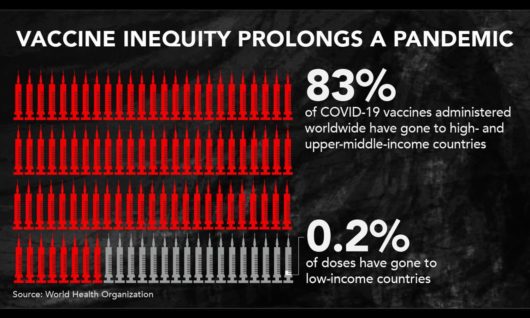
700,000 Americans are now documented dead from COVID-19, making it the deadliest disease event in American history. This grim stat exceeds even the number of deaths from the infamous 1918 Spanish Influenza. To date, 400 million doses of highly effective COVID-19 vaccine have been given in the US and just now added is a third dose of the Pfizer vaccine for people of higher risk.
But some ethicists and public health experts are crying foul. At this same moment, less than 1% of people living in low-income nations have received even one dose of a COVID-19 vaccine, and the disease runs unchecked throughout Africa, South America, and southern Asia. This vaccine inequity, they argue, violates the universal principles of beneficence and justice. Even the principle of enlightened self-interest, also known as common good, is violated because in a global pandemic actually no one is safe until everyone is safe.
Vaccine equity is only one pressing issue in international health today. Others include global gender inequality, globalism vs “statism,” and persistent “brain drain.” This fall, INMED is offering the International Healthcare Ethics Course, taught by Scott Armistead. Dr. Armistead and his family lived in Pakistan from 1999-2015, speaking Urdu and providing medical care at Bach Christian Hospital, plus two more years service at Kanad Hospital in the United Arab Emirates.
The INMED International Healthcare Ethics Course is a two-credit hour learning opportunity, either standalone or as part of the Master’ Degree in International Health, and includes credible voices from both Euro-American and other cultural perspectives. Course graduates will gain an understanding of the breadth of complexity from which sound ethical decision-making occurs in an international context and be capable of speaking wisdom into compelling issues like vaccine equity.
